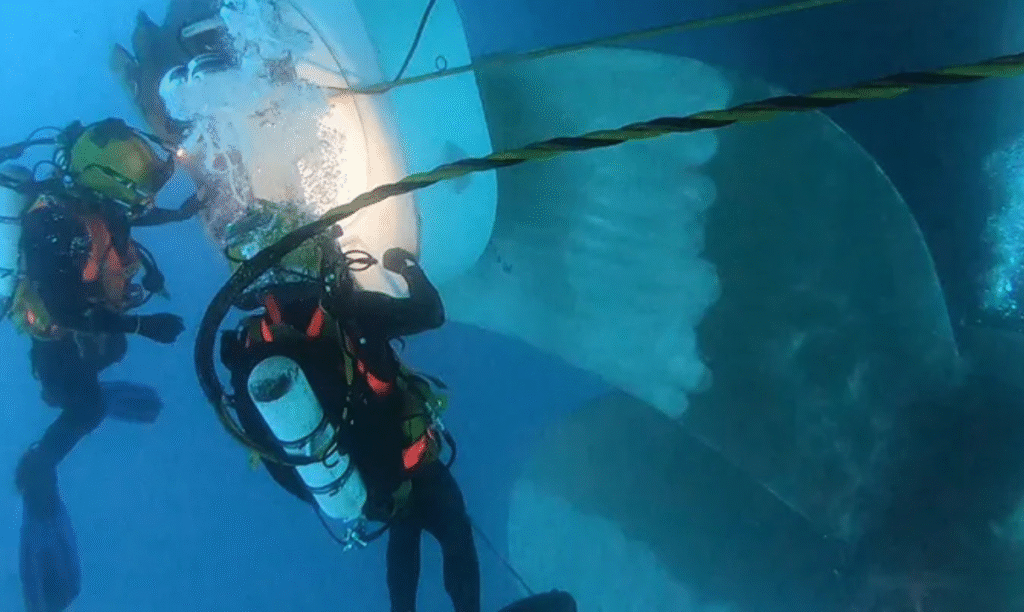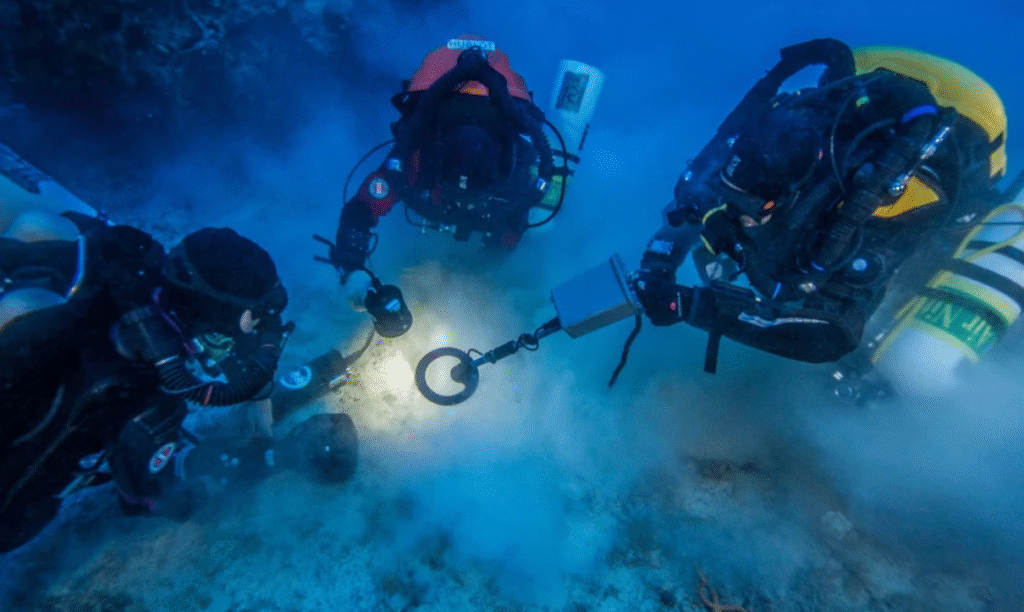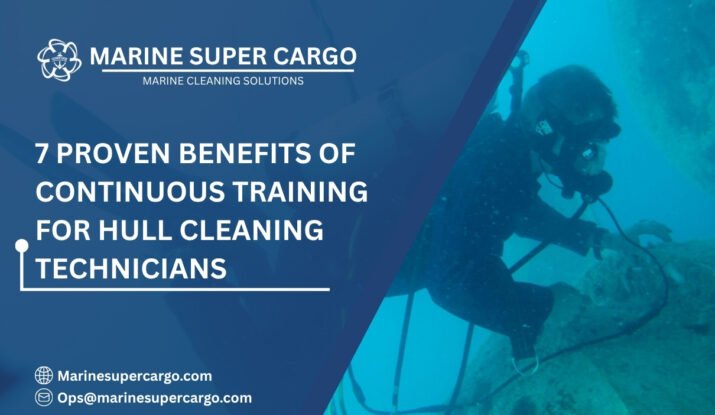When you think about the role of hull cleaning technicians, it’s easy to picture divers scrubbing marine growth from massive ship hulls. But beneath that physical task lies something far more strategic: professional growth. Just like ships require constant upkeep to sail efficiently, hull cleaning technicians also need continuous professional development (CPD) to stay relevant, compliant, safe, and environmentally responsible.
In this long-read, we’ll explore why CPD isn’t just a buzzword but the backbone of a thriving career in hull cleaning. We’ll also dive deep into how training impacts compliance, safety standards, cost efficiencies, and environmental outcomes. Whether you’re a technician yourself, a ship manager, or an operator, understanding this is vital.
Why Professional Growth is as Crucial as Clean Hulls
A ship with biofouling (marine organisms attached to its hull) faces increased drag, fuel inefficiency, and higher emissions. Similarly, hull cleaning technicians who stop upgrading their skills can slow down progress, increase operational risks, and cause compliance failures.
Continuous professional development ensures technicians remain aligned with:
- Global regulations like the MARPOL Convention are enforced by the International Maritime Organization (IMO).
- Best practice standards are set by organizations such as the International Marine Contractors Association (IMCA).
- Environmental commitments that ports and ship operators make to reduce carbon footprints, often through initiatives supported by the International Association of Ports and Harbors (IAPH).

The Core Challenges Hull Cleaning Technicians Face
Before we look at how training helps, let’s understand the challenges technicians encounter daily:
Underwater Safety Risks
Divers often work in low-visibility conditions with sharp barnacles, strong currents, and limited access to emergency support. Without updated training on safety and equipment use, risks multiply.
Rapidly Changing Regulations
Hull cleaning is tied directly to environmental regulations around biofouling and invasive species. Technicians need continuous updates to comply with IMO guidelines or face hefty penalties for non-compliance.
Technology Adoption
From remotely operated cleaning equipment to eco-friendly brushing systems, new technologies are reshaping hull cleaning. But without training, even the best tools fall short of effectiveness.
Client Expectations
Ship owners demand efficiency, minimal downtime, and guaranteed compliance. If technicians lack advanced skill sets or certifications, trust and contracts may be lost.
The Role of Continuous Professional Development
Training is not a one-off event; it’s a cycle that sustains growth. For hull cleaning technicians, CPD brings multiple advantages.
Enhanced Safety
- Regular training reduces accidents underwater.
- Refresher courses on diver rescue protocols and IMCA safety standards improve response times during emergencies.
- Updated use of personal protective equipment (PPE) ensures fewer health hazards.
Better Compliance
- CPD ensures technicians align with MARPOL and IMO biofouling guidelines.
- Audit-ready documentation becomes simpler when technicians are updated on reporting procedures.
- Proper training reduces liability for operators who could otherwise face fines.
Advanced Technical Skills
- Familiarity with high-pressure water jet systems or robotic hull cleaners improves work efficiency.
- Training in sustainable methods ensures operations do not damage protective hull coatings.
- Exposure to case studies and simulations helps technicians troubleshoot faster on-site.
Cost Savings for Ship Operators
- A properly cleaned hull reduces fuel consumption by up to 15%.
- Fewer errors mean reduced downtime and maintenance rescheduling.
- Long-term savings appear when technicians extend coating lifespans through specialized cleaning protocols.
Environmental Benefits
- Trained technicians ensure more thorough removal of invasive species, preventing ecological disruption.
- Adoption of eco-friendly cleaning technologies reduces underwater noise and chemical contamination.
- Cleaner hulls align with port sustainability targets supported by IAPH.
✅ 4 Things to Check for Safety at Sea pic.twitter.com/dAxhJQ2i6U
— Marine Super Cargo (@Marinsupercargo) September 14, 2025
Real-Life Examples of CPD in Action
The Port of Rotterdam Case Study
Hull cleaning technicians trained in new robotic systems managed to finish cleaning a 70,000 DWT vessel 25% faster than before. This saved both port fees and fuel costs.
Singapore’s IMCA Training Drive
Companies are mandated to provide refresher safety training every six months. Result: incidents dropped by 40%, reinforcing why CPD is more than just theory—it saves lives.
CleanShip.co Partnerships
By aligning technician training with sustainability goals, ship operators partnered with CleanShip.co not only reduced operational costs but also reported compliance confidence during port inspections.
Best CPD Approaches for Hull Cleaning Technicians
If you’re planning to upgrade your crew, here’s what works best:
Certification Programs
- IMO-recognized certificates build credibility.
- Specialized courses in biofouling and invasive species removal improve client trust.
Hands-On Training
- Using simulators for hull cleaning prepares technicians for diverse scenarios.
- Port-specific workshops help adapt to regional compliance differences.
Knowledge Exchange
- Cross-national teams can share best practices, enriching local experience with global insights.
- Webinars and online forums connect hull cleaning technicians worldwide.
Technology Training
- Learning to operate remote underwater vehicles (ROVs).
- Maintenance training for eco-brush systems saves repair delays.
Compliance and CPD: The Inseparable Duo
CPD and compliance go hand in hand. Without updates, technicians risk falling behind in areas like:
- IMO biofouling management guidelines
- MARPOL Annex V environmental requirements
- Port-specific regulations on invasive species
Regular training ensures technicians understand why compliance matters—not just the “what.” It empowers them to become active contributors rather than passive rule-followers.

Future Trends in Hull Cleaning Training
The marine industry is evolving, and with it, hull cleaning professions. In the years ahead, CPD will likely include:
- Virtual Reality Simulators: Training in risk-free environments before diving.
- AI-Powered Learning Platforms: Personalized training modules for technicians.
- Remote Assistance: Surface supervisors guiding divers in real-time via augmented reality helmets.
- Green Skill Certifications: Recognizing technicians for sustainable cleaning practices.
These innovations signal that hull cleaning technicians of the future will be more tech-driven, eco-conscious, and regulation-savvy than ever.
Conclusion
For hull cleaning technicians, professional development is not optional—it’s mission-critical. Just as a ship slows down with biofouling, technicians risk inefficiency without continuous training.
Key Takeaways:
- Continuous professional development enhances safety, compliance, and efficiency.
- Skilled hull cleaning technicians help operators save costs and protect the environment.
- Future-focused CPD ensures adaptability to tech innovations and stricter regulations.
If you want to strengthen compliance, improve operational efficiency, and contribute to greener seas, partnering with sustainability leaders like CleanShip.co is your next step forward.
FAQs:
Q1. Why is CPD essential for hull cleaning technicians?
It keeps technicians updated on safety, technology, and environmental standards, ensuring better compliance and operational efficiency.
Q2. How does training impact vessel performance?
Well-trained technicians improve hull cleaning quality, leading to reduced fuel consumption, extended coating life, and smoother voyages.
Q3. What certifications should hull cleaning technicians pursue?
Courses recognized by IMO or IMCA, plus specialty programs in biofouling and sustainable cleaning methods, add credibility and client trust.
Q4. How does CPD contribute to environmental protection?
By training technicians in eco-friendly methods, CPD minimizes marine ecosystem disruption and supports MARPOL compliance.
Q5. What’s the future of professional development in hull cleaning?
Expect VR training, AI-driven learning modules, and certifications focused on green practices shaping the next wave of this profession.


